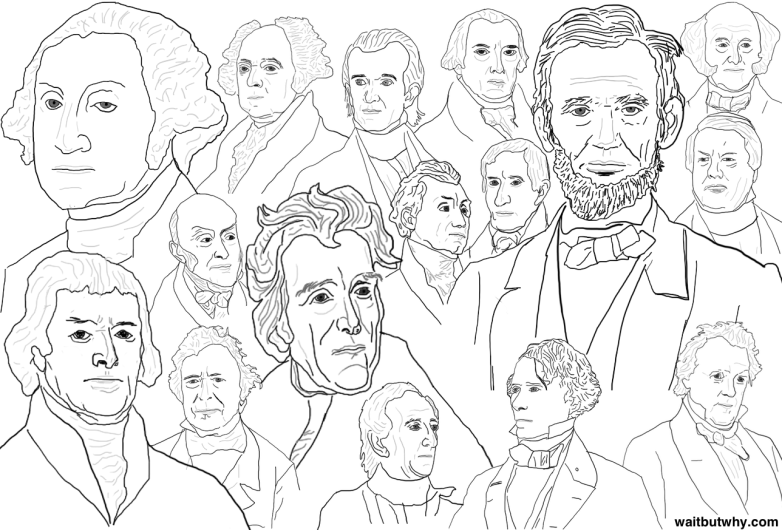22 and 24) Grover Cleveland and Grover Cleveland
Presidency: 1885 – 1889 Presidency Again: 1893-1897 Lived: 1837 – 1908 Ranking: 19/43
Mustache? Yes.
His Deal: Our most walrussy president, Grover Cleveland is an anomaly in his era for two reasons:
1) He’s the only Democrat to be elected president during an otherwise completely Republican-dominated half century. No other Democrat would win the presidency between James Buchanan in 1857 and Woodrow Wilson in 1913.
2) He’s the only president in the 50 years between the end of the Civil War and Roosevelt’s 1905 election to not have fought in the Civil War.
This remarkable feat by Cleveland is especially surprising, given that for most of his life before becoming president, he didn’t really have either political ambitions or an impressive resume.
He grew up in New York with little formal education, and at the age of 18, without much of a plan, decided to head west. His first and last stop ended up being Buffalo, where his uncle offered him a clerical job and introduced him to some of the important people around town, including some law partners, who offered him a clerkship. While working at the law firm, Cleveland taught himself law, eventually started his own practice, and was later appointed assistant district attorney of Erie County. This was during the war, and instead of fighting, he paid a Polish immigrant $150 to serve in his place so he could focus on his job and not get shot in the face.
Then, at the age of 33, he campaigned to become sheriff of Erie County and won, and he did that for about a decade. On two occasions, he sprung the trap at a hanging, making him the only US president who was also an executioner. Otherwise, his years as a sheriff were described as unremarkable.
Boring so far, right?
At this point, it’s 1881, he’s turning 44, and he’s living an upstanding, respectable, but pretty ordinary and undistinguished life. So how is it possible that four years later, he’d become the one Democrat in the era of Republican dominance to take the presidential oath?
Well in an era when powerful and corrupt political machines were gaining more and more control, it happened to be the perfect setting for an unflashy, highly honest, fervently anti-corruption guy to shine. Cleveland didn’t know it then, but he was the exact right guy to get into politics at that exact time—and it so happens that Buffalo’s Democrats were looking for a reputably honest guy to run for Mayor that year and approached their sheriff about making a run for it. He accepted and won.
As mayor, Cleveland did what came natural to him after ten years as a sheriff and cracked down on corruption, unafraid to take on powerful business interests. The country was thirsty for this kind of character and his reputation quickly spread beyond Buffalo throughout greater New York. Two years after becoming mayor, he was New York’s governor.
Continuing to dismantle corruption and irk the political machines, Cleveland’s popularity soared in New York and he was seen as a new star in the party. When it came time to select nominees for president, the Democrats’ first choice (the guy who played Gore in the Bush-Gore-esque election of 1876) turned down the offer, and Cleveland ended up as part of a group of second-tier options. For various reasons, each of those options had something in their past that hurt their chances of winning—except for Cleveland, who had no past record because he started being a politician eight seconds ago. Cleveland got the nomination, and during the campaign, the Democrats focused on the corrupt record of his opponent, James Blaine. Honesty was the key quality for voters in 1884, and four years after reluctantly agreeing to run for Mayor of Buffalo, Grover Cleveland became the 22nd US president.
His Presidency: Cleveland’s presidency stood in sharp contrast to the series of those before it, as he opposed a number of the more progressive measures the Republicans had been working on for the past few decades (though he aligned with his predecessors when it came to civil service reform, which correlated with his leanings against corruption).
One major issue he dealt with was the fight over whether American money should only be backed by gold or by both gold and silver—Cleveland, along with most northeast politicians, adamantly opposed silver backing, while those in the south and the west stood in favor of it. Really old-fashioned issue that kind of bored the shit out of me to read about.
Cleveland saw Reconstruction as a failed experiment and lacked the previous post-Civil War presidents’ desire to heavily involve the White House in ensuring black voting rights in the South. He also departed from past presidents by firmly opposing anything resembling foreign expansion or imperialism.
In a bunch of instances, Cleveland’s philosophies on government really reminded me of today’s Republicans, emphasizing that this era’s Democrats and Republicans are in many ways more like the other party in today’s politics. For example, when there was a Texas drought that hurt the crops of farmers there, Congress allotted $10,000 to buy seed grain to help them recover. But Cleveland vetoed the expenditure and explained why like this:
I can find no warrant for such an appropriation in the Constitution, and I do not believe that the power and duty of the general government ought to be extended to the relief of individual suffering which is in no manner properly related to the public service or benefit. A prevalent tendency to disregard the limited mission of this power and duty should, I think, be steadfastly resisted, to the end that the lesson should be constantly enforced that, though the people support the government, the government should not support the people. The friendliness and charity of our countrymen can always be relied upon to relieve their fellow-citizens in misfortune. This has been repeatedly and quite lately demonstrated. Federal aid in such cases encourages the expectation of paternal care on the part of the government and weakens the sturdiness of our national character.
Sound familiar?
At the end of his term, Cleveland sought reelection and beat his opponent, Benjamin Harrison, in the popular vote, but was edged out in the electoral college. The Republicans were accused of orchestrating voting fraud in several swing states, which in such a close election would definitely have made the difference, if it happened.
Either way, Cleveland lost, so he went back to a normal life and began practicing law again. I find this kind of weird—imagine hiring the guy who was just finished being president as your lawyer? Really different times.
Four years later, Cleveland ran for president again, won the nomination, and faced Harrison in a rematch. If you want to hear what Grover Cleveland’s voice sounded like or what a campaign speech in 1892 sounded like, check this out.
Cleveland ended up winning, forever forcing Americans to deal with saying things like, “Obama is the 44th presidency, but only the 43rd president.”
His Presidency, Again: Cleveland maybe should have quit after one term, because the second term didn’t go well. The term began with the hideous Panic of 1893 and ensuing economic depression. Cleveland was unable to reverse this and by the time his term was over, fair or not, he was blamed for the hard times and the Democrats were in the doghouse again and the next three presidential elections would go to the Republicans.
Harrison had spent much of his term undoing things Cleveland had done in his first term, and Cleveland spent much of his second term undoing Harrison’s undoing of those things. Among other things, Cleveland hated Harrison’s raising of the import tariff and Harrison’s favorable policies toward silver backing. Harrison was also on his way to annexing Hawaii, but when Cleveland got back in office, he was skeptical. He sent a representative to Hawaii to closely examine the situation and report back about it, and what he learned left Cleveland unconvinced this was a necessary plan—he ended up skipping it, staying consistent with his non-interventionist philosophy.
At the end of his term, Cleveland had fallen out of favor with much of his own party and didn’t run again. He spent the next 12 years hanging around Princeton University (where Woodrow Wilson was the president) until he died of a heart attack at age 71.
Things He Can Brag About:
- He’s on the $1,000 bill, which is kind of a rad bill to be on.
- He was the president in office when the Statue of Liberty went up in 1886.
Things He Hopes We Don’t Remember:
- In an article he wrote in 1905, when the debate over women’s suffrage was raging, Cleveland dropped this line: “Sensible and responsible women do not want to vote. The relative positions to be assumed by men and women in the working out of our civilization were assigned long ago by a higher intelligence.”
Things He’s Annoyed About:
- Oscar Folsom Cleveland, the most inconvenient child ever. During Cleveland’s first run for president, the opposing side uncovered the story that Cleveland had an illegitimate child from his Buffalo days that he had abandoned. Cleveland admitted that he had paid child support to the mother, but insisted that the woman slept with basically everyone that existed and that it wasn’t clear the kid was his. The woman adamantly claimed that it was his. This annoyed the shit out of Cleveland, especially when the opposition made funny cartoons like this.
Other Notable Facts:
- He was distantly related to General Moses Cleaveland, the guy Cleveland, Ohio is named after.
- His real name is Stephen Grover Cleveland, but he always went by Grover, which is likely related to the fact that Stephen Cleveland sounds ridiculous. Odd move by his parents.
- During his second term, he developed an upsetting tumor on the roof of his mouth and needed surgery. He thought it was important to keep this a secret, so the surgery took place on a yacht, and he lived the rest of his life with a rubber jaw.
- Cleveland is the only president to get married (to his first wife) while in office. He began his first presidency as a bachelor, and after he was visited by 21-year-old Frances Folsom (Cleveland was 49), a girl he had helped raise after her father, Cleveland’s friend, had passed away. Feeling ballsy enough to go for a girl 28 years younger than him while president, Cleveland asked her mother for permission to correspond with her (funny thing for the president to have to do), and ended up marrying her while in office—making her the youngest First Lady.
- His new wife might have been awesome. After Cleveland lost his reelection bid by a hair, as he and Frances were leaving the White House, she said to a staff member, “I want you to take good care of all the furniture and ornaments in the house, for I want to find everything just as it is now, when we come back again.” The staff member asked her when she was referring to, and she responded, “We are coming back four years from today.”
Last Words: “I have tried so hard to do right.” I’ll give that to him—it seems like he actually did.
All Pages:
Andrew Johnson (and Intro)
Ulysses S. Grant
Rutherford B. Hayes
James A. Garfield
Chester A. Arthur
Grover Cleveland
Benjamin Harrison
William McKinley






